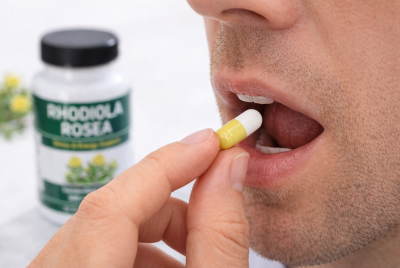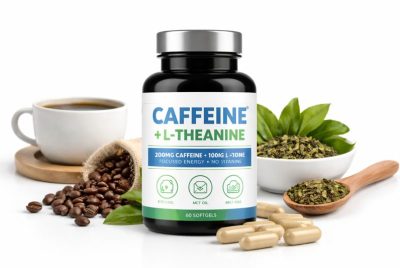Best Supplements for Dementia Patients: Brain-Boosting Options
We may earn a commission for purchases made using our links. Please see our disclosure for more details.
Dementia is a tough journey, not only for the person experiencing it but for their loved ones as well. It can be heartbreaking to watch someone suffer from confusion and memory loss, and it’s natural to want to help them as much as you can. The right vitamins can provide support, enhance brain function, and even slow down cognitive decline, even though there isn’t a panacea. Here are some of the top supplements for dementia patients if you’re searching for ways to improve brain health.
Understanding Dementia and Its Impact
Before we dive into the best supplements, we must first understand what dementia really is and how it affects the patient. Dementia affects thinking, logic, and even the capacity to carry out daily chores; it is not simply about amnesia. It can eventually become too much to handle, making even the most basic tasks challenging. Although there are therapies for this disorder, which is caused by damage to brain cells, there is no known cure. To ensure that the brain receives the nutrition it needs to perform at its peak, many individuals use supplements to give it an extra boost.
Why Consider Supplements for Dementia?
Food sustains our bodies, as we all know, but did you realize that some nutrients are essential for brain function? Sadly, a lot of diets lack in necessary minerals and vitamins, which might affect how well people think. Supplements improve memory, attention, and overall brain function by bridging these gaps. The right supplement combination can significantly slow down cognitive decline in dementia patients.
Omega-3 Fatty Acids: The Brain’s Best Friend
Omega-3 fatty acids are partly to blame for the claim that fish is brain fuel. These powerful minerals, which are included in fish oil, aid in lowering brain inflammation and shielding neurons from harm. They may reduce cognitive decline, especially in the early stages of dementia, according to research. Omega-3 supplements might be a fantastic method to make sure your loved one gets this vital ingredient that boosts brain function if they don’t like seafood. Research has shown that omega-3 fatty acids, particularly docosahexaenoic acid (DHA), may help reduce the risk of dementia by supporting nerve cell membranes and reducing inflammation in the brain.
Vitamin B12: The Memory Booster
Have you ever walked into a room and forgotten why you were there in the first place? Well, that happens to me oftentimes, even if I don’t have dementia. The culprit? It could be caused by a deficiency in vitamin B12. A lack of this vital vitamin can cause disorientation and cognitive impairment because it is important for nerve function and memory. Taking a supplement can help keep older folks’ brains healthy and sharp because many of them have trouble absorbing vitamin B12 from their diet. Studies suggest that vitamin B12 plays a crucial role in cognitive function, and while short-term studies found no significant improvement, long-term supplementation may help slow cognitive decline.
Vitamin D: The Sunshine Vitamin
Getting enough vitamin D isn’t just important for bones—it’s crucial for brain health, too. Studies have linked low vitamin D levels to an increased risk of dementia, and since many seniors don’t get enough sunlight, deficiency is common. This vitamin supports nerve health and helps reduce inflammation, which can be beneficial for brain function. A simple daily supplement can make a world of difference in keeping cognitive decline at bay.
Ginkgo Biloba: An Ancient Brain Tonic
For centuries, ginkgo biloba has been used to support memory and mental clarity. It works by improving blood flow to the brain, ensuring that oxygen and nutrients reach the cells that need them most. Some studies suggest it may even help slow down dementia symptoms and improve focus. While it’s not a cure, adding ginkgo biloba to a daily routine can be a natural way to support better cognitive function. Check out this article on nootropics for anxiety for more helpful tips.
Turmeric: The Golden Spice for Brain Health
Turmeric is more than just a delicious spice—it’s packed with curcumin, a powerful antioxidant that can fight inflammation in the brain. Many researchers believe inflammation plays a role in Alzheimer’s disease, so reducing it may help protect brain cells. Regular turmeric consumption or curcumin supplements can support brain health and may even improve memory. Plus, who doesn’t love a warm cup of golden milk?
Coenzyme Q10: The Cellular Energizer
Every cell in your body needs energy, and Coenzyme Q10 (CoQ10) helps make that happen. It’s essential for mitochondrial function, which means it keeps brain cells powered and working efficiently. Some studies suggest that CoQ10 can help combat oxidative stress, a key factor in cognitive decline. If your loved one is struggling with fatigue and brain fog, this supplement might be a game-changer.
Magnesium: The Relaxation Mineral
Magnesium is often overlooked, but it plays a crucial role in brain function. It helps with nerve signaling, protects against brain aging, and can even improve sleep—something that many dementia patients struggle with. Studies suggest that a magnesium-rich diet or supplementation may help with cognitive function and reduce anxiety. If your loved one is experiencing restlessness or brain fog, adding magnesium to their routine could help bring a sense of calm.

L-Theanine: The Stress Reliever
Dementia can cause a lot of anxiety and stress, not just for the patient but for their caregivers too. L-theanine, an amino acid found in green tea, promotes relaxation and reduces anxiety without causing drowsiness. It can help dementia patients feel calmer, improve focus, and even support better sleep. A cup of green tea or an L-theanine supplement might be just what they need for a little peace of mind.
Resveratrol: The Antioxidant Powerhouse
Resveratrol is found in red wine and grapes and has been linked to brain health benefits. This powerful antioxidant helps protect brain cells from damage and may slow the formation of plaques that contribute to Alzheimer’s disease. While sipping wine every day might not be practical, a resveratrol supplement can provide similar benefits. It’s a simple way to give the brain extra protection against cognitive decline.
Phosphatidylserine: The Memory Enhancer
Phosphatidylserine is a fatty substance that supports brain cell communication and helps keep memory sharp. Some research suggests it can help slow memory loss in people with dementia, making it a promising supplement for cognitive support. Since our natural levels decline with age, supplementation may help maintain mental clarity. If memory lapses are becoming more frequent, this could be a helpful addition.
Acetyl-L-Carnitine: The Brain Fuel
Think of acetyl-L-carnitine as fuel for the brain—it helps produce energy and supports cognitive function. Some studies suggest it may improve memory and reduce mental fatigue, making it a great option for dementia patients. It works by protecting neurons and enhancing neurotransmitter activity, helping the brain function more efficiently. If your loved one seems mentally sluggish, this supplement might provide a helpful boost.
Probiotics: The Gut-Brain Connection
Did you know your gut and brain are deeply connected? An unhealthy gut can lead to increased inflammation, which can impact cognitive function. Probiotics help maintain a healthy balance of gut bacteria, which may support brain health as well. A daily probiotic supplement can contribute to overall well-being and may even improve mood and memory.
CBD Oil: The Calming Agent
CBD oil has been gaining attention for its potential to reduce anxiety and agitation in dementia patients. It may also have neuroprotective properties, helping to protect brain cells from damage. While research is still ongoing, many caregivers have reported positive effects in terms of relaxation and mood improvement. If you’re looking for a natural way to ease stress, CBD oil might be worth considering.
Are These Supplements Safe?
While many of these supplements offer promising benefits, it’s important to consult a doctor before introducing them to a dementia patient’s routine. Some supplements can interact with medications or may not be suitable for certain health conditions. A healthcare professional can provide guidance on the right dosages and ensure they’re safe for your loved one. Taking a thoughtful approach can help maximize the benefits while avoiding potential risks.

Top Products for Dementia Support
Here are some supplements and products that may support brain health and cognitive function for dementia patients:
Brain Health Supplements
- Omega-3 Fish Oil – Supports cognitive function and reduces brain inflammation.
- Vitamin B12 – Helps prevent memory loss and supports nerve health.
- Ginkgo Biloba – Promotes better blood circulation to the brain.
Memory and Cognitive Support Products
- DHA-Rich Algal Oil (Vegan Omega-3s) – A plant-based alternative to fish oil for brain support.
- Probiotic Supplements – Supports gut health, which is linked to brain function.
- CBD Oil or Capsules – Helps with stress, anxiety, and relaxation.
- Acetyl-L-Carnitine – Aids in energy production and memory retention.
These products, combined with a healthy lifestyle, can contribute to better brain health and improve the quality of life for individuals with dementia. Always consult a healthcare professional before introducing any new supplements.
Lifestyle Factors That Enhance Supplement Effectiveness
Supplements work best when paired with a healthy lifestyle. Encouraging a nutrient-rich diet, regular exercise, and mental stimulation can further support brain function. Simple activities like puzzles, reading, and social interaction help keep the mind active. Quality sleep and stress management are also key in promoting overall cognitive health.
Conclusion
Dementia is a tough battle, but the right supplements, paired with a healthy lifestyle, can make a difference. While there’s no cure, small steps like choosing brain-friendly nutrients and maintaining an active mind can offer hope. Caregivers and loved ones can take comfort in knowing that even small changes may contribute to a better quality of life. Keep exploring options and never underestimate the power of nutrition and care.
FAQs
1. Can supplements cure dementia?
No, supplements cannot cure dementia, but they can support brain health, improve cognitive function, and slow progression when used alongside a healthy lifestyle.
2. How long does it take to see results from these supplements?
Results vary from person to person. Some people may notice improvements within a few weeks, while others may take months to experience noticeable benefits.
3. Are there any side effects of these supplements?
Most supplements are safe when taken as directed, but some can interact with medications or cause mild side effects like digestive discomfort. It’s always best to consult a doctor before starting any new supplement.
4. Which supplement is the most effective for dementia?
Omega-3 fatty acids, vitamin B12, ginkgo biloba, and phosphatidylserine are among the most researched and effective supplements for brain health and cognitive support.
5. Can diet alone provide these nutrients?
A well-balanced diet rich in whole foods can provide many essential nutrients, but supplements can help fill gaps, especially for seniors who have trouble absorbing nutrients from food.




